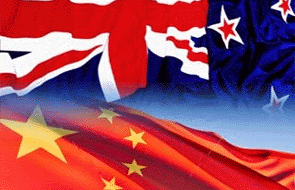
On Friday, the RBNZ published an Analytical Note on "The Economic Linkages between New Zealand and China".
Authored by Ross Kendall, it traces the changes and trends of the Chinese economy and filters in the New Zealand economic relationship.
Kendall's analysis of this New Zealand overlay concludes that we have benefited greatly from the relationship.
New Zealand has gained higher prices for its exports, and purchased its imports at lower prices by being involved in the trade.
Policy changes in China also look like they will benefit New Zealand, according to this analysis. While the decline in investment in capital goods in China may be waning and this will bring lower growth rates, the shift to consimption is expected to continue, bolstering demand for the products we sell them.
The full analysis is here.
Here is the "Non-technical summary" that was released with the Note:
Over the past several decades, China’s share of global output and trade – and of trade with New Zealand – has increased rapidly.
Although China’s economy is expected to continue to grow quite rapidly, the pace of credit-fuelled growth in investment since the global financial crisis has increased the chance of a sharp slowdown at some point.
Recognising this risk, the Chinese authorities have announced an ambitious reform agenda, which if successfully implemented should help to address economic imbalances and support ongoing productivity growth.
China is now one of New Zealand’s largest trading partners. But New Zealand’s most significant economic linkage to China may be through China’s impact on the terms of trade – the global prices of the things we buy and sell – rather than through the direct trade channel itself.
New Zealand’s terms of trade have increased significantly over the past 15 years, with China contributing both to higher export prices and lower import prices.
Increasing demand from urban consumers has seen the real world prices of many of the primary products we export increase sharply. And China’s industrialisation has put considerable downward pressure on the world prices of imported manufactured goods.
New Zealand is also indirectly exposed through China’s connections to the global economy and to our major trading partners in the Asia-Pacific region in particular.
If Chinese growth were to slow markedly, demand for New Zealand’s exports may be relatively robust if consumption continues to grow, but demand for capital goods and industrial raw materials from the rest of the world could be expected to slow significantly.
The limited room for further policy easing in most advanced economies helps highlight the importance of this risk.
There is potential for considerable further growth in demand for our export products, especially if the Chinese authorities’ reform agenda is implemented successfully.
As with any trading relationship, there are risks from the trade our firms undertake with China. However, the share of our trade with China (about 17 percent in the past year) is not materially higher than China’s share of global economic output.
The volume of our exports to China itself may be relatively robust in the face of a slowdown in China.
However, much of New Zealand’s economic exposure to China – through its impact on the global economy and our major trading partners – is likely to exist regardless of the extent of New Zealand firms’ direct trade with China.

We welcome your comments below. If you are not already registered, please register to comment
Remember we welcome robust, respectful and insightful debate. We don't welcome abusive or defamatory comments and will de-register those repeatedly making such comments. Our current comment policy is here.